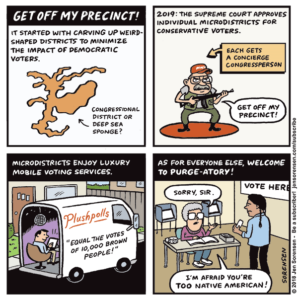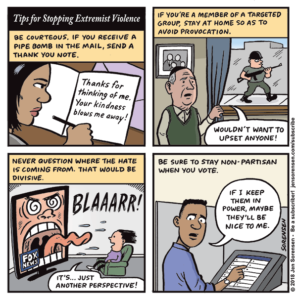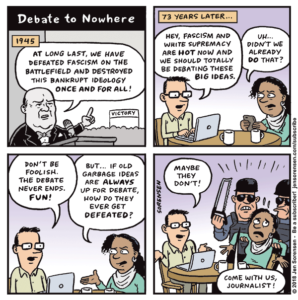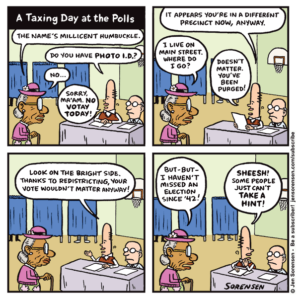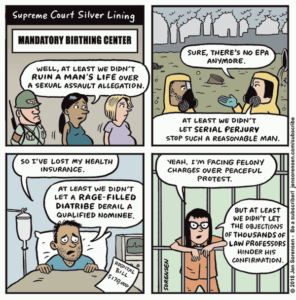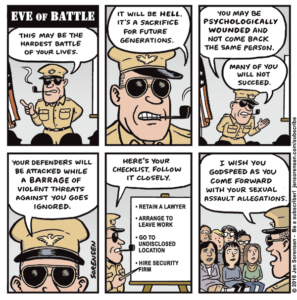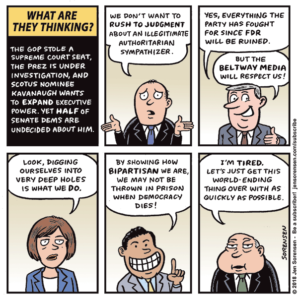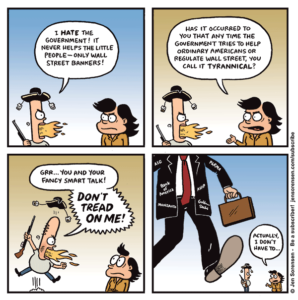The Sorensen Monologues
America Then and Now
My short take on the election is that the results were not bad, but we have a long, long way to go to restore sanity. Just thinking about the Supreme Court gives me the willies.
Get Off My Precinct!
A bit late posting here as I’m traveling abroad. I had to draw this one before the election results, but given what happened in Georgia, it’s still unfortunately relevant. Gerrymandering and other voter suppression efforts have gotten so extreme now that Democrats must win by huge margins to actually, you know, win. Things have gotten so bad that elections have become about whether to keep what little democracy we have left. We are in an emergency situation for our country, yet many media outlets spent the week before the election obsessing over the non-story of the “caravan.” If anything, voter suppression efforts should be receiving that kind of breathless coverage.
The specific issue with Native American voting rights I’m referring to in panel four is described here.
Help sustain these cartoons — join the Sorensen Subscription Service!
Tips for Stopping Extremist Violence
Sometimes I can’t believe the things I have to draw cartoons about these days. When I began the weekly strip some eighteen years ago or so, I never imagined I’d be making the case against fascism in America. It felt like the dam broke this past week, that whatever was holding back an explosion of violent nutballery that’s been waiting in the wings is now gone. All I can do is try to point out the obvious, that these acts are the culmination of decades of over-the-top conspiracy theorizing and incitement on the American right. And no amount of being “nicer” or more “open-minded” is going to change things.
Debate to Nowhere
In previous cartoons, I have dealt with the folly of giving fascists and roundly-discredited racial theorists prestigious speaking platforms — such as Steve Bannon headlining the New Yorker ideas festival — and made the case that it is not “closed-minded” to object to such norm-violating appointments. Here I take on the same basic topic from another angle: if fascists and racists must be treated as part of serious contemporary intellectual debate, as some insist, surely there must be some point when the debate is over? If not, then it follows that there’s no way to ever condemn a set of ideas or come to any conclusions. An analog would be people who want endless “debate” over climate change, long after scientific consensus has been established. The Bannons and climate deniers of the world are free to speak their nonsense, but rehashing it endlessly leads absolutely nowhere.
Voter Purge Surge
This has been one of those weeks for me. I broke my phone, then someone smashed my car window and stole a bag containing my scanner (fortunately I had my computer), all my art supplies, and a book about birding… probably not the haul they were expecting. So I’ve been a little stressed. Luckily, this “classic” strip was easily updated for the horrific situation in Georgia, where Kemp is taking voter suppression to new extremes.
The GOP has become absolutely brazen about ignoring basic democratic principles. It’s all very frightening and makes it all the more imperative that those of us who can still vote do in fact vote.
In other news, I contributed a couple illustrations to this book, along with many other political cartoonists.
Supreme Court Silver Lining
A week ago someone asked me what I thought the odds were of Kavanaugh being confirmed. This was when many people thought his nomination was doomed. I said 10:1 he will be confirmed. My read all along has been that there is simply no mechanism left to stop Republican lawlessness.They simply do not care about any of the standards that matter in a normal democracy. Perjury doesn’t matter, evidence of sexual assault doesn’t matter, thousands of law professors signing a letter saying that he is not qualifed doesn’t matter. And here we are.
High School Slang According to Brett Kavanaugh
I have noted before that the Trump era is often difficult to parody because it is already so extreme, and nothing illustrates this better than the Kavanaugh hearings. The man is a serial liar, and it’s not at all hard to prove. His laughable explanations for the slang terms he used in his high school yearbook are such obvious hogwash, it’s like he wasn’t even trying to be plausible. The thing is, these weren’t just little lies — they were directly related to his history of binge drinking and his attitudes toward women in high school and college. Whatever his behavior then, he’s lying now, and should be nowhere near a position of power that involves evaluating evidence.
There is a darkly entertaining article about a gay punk who was unfortunate enough to share Kavanaugh’s dorm at Yale. If Kavanaugh is confirmed, I’m afraid we will all be that guy.
Eve of Battle
I can hardly stand to watch the reactions of the powers that be to Kavanaugh’s accusers, who are putting their lives at risk to speak out. It’s excruciating to see these women get slimed — and I’m not even experiencing this as a survivor of sexual assault. They are heroes in my book, even if they’re reluctant ones. After reading about the Yale allegations last night, I was imagining all the preparations these people have to go through before they tell their stories — lawyering up, steeling themselves against an overwhelming public backlash via every means of communication imaginable. It occurred to me that it must feel like preparing for war.
Kavanaugh’s Oath
We know Kavanaugh has lied multiple times under oath. Meanwhile, his accuser has passed an FBI polygraph test, can point to evidence in her therapist’s notes from 2012, and contacted the Washington Post before Kavanaugh was even nominated by Trump (so this is not an “eleventh-hour” accusation). Why should anyone believe him when he accuses her of lying? He’s lost any claim to credibility.
In case anyone is wondering who the woman in the cartoon is, that’s supposed to be Kavanaugh’s wife, since the spouse usually holds the Bible during the oath of office ceremony.
Kavanaugh suddenly possessed by spirit of honesty
In his response to Kamala Harris’s question about whether he thought “both sides” were to blame for the deadly white supremacist rally in Charlottesville, Kavanaugh demurred, saying “the principle of the independence of the judiciary means I can’t insert myself into politics in either of two ways: commenting on political events or, in my view, commenting on things said by politicians.” This rhetoric is pretty funny coming from a man whose history suggests he’s a quintessential partisan player, apparently perjuring himself twice over stolen Democratic memos and participating in all manner of wingnuttery during the Clinton years.
There’s been a bit of controversy around Kavanaugh’s statement about “abortion-inducing drugs.” Some background: Priests for Life and other Catholic institutions sued to contest the Affordable Care Act rule that employer-provided insurance must cover contraception, or the employer must sign an opt-out form. During the hearings, Ted Cruz asked Kavanaugh for his opinion about the case. Kavanaugh, siding strongly with Priests For Life, stated “they said filling out the form would make them complicit in the provision of the abortion-inducing drugs.” Various fact-checking organizations are zeroing in on the words “they said” to imply that Kavanaugh is referring only to the beliefs of Priests for Life, and to sneeringly suggest that Kamala Harris and other Democrats are lying when they accuse him of conflating birth control with abortion-inducing drugs.
However, Kavanaugh’s use of the word “the” in the phrase “provision of the abortion-inducing drugs” implies identification on his part with the Priests for Life perspective. A more impartial, less affirmative way to speak about the scientifically-false belief of a religious group would be to use the phrase “their belief that these drugs cause abortion.” Kavanaugh did not distance himself from Priests For Life in this manner. This sort of casual conflation is exactly the sort of thing someone who opposes reproductive rights would say. Not to mention the fact that he sided with an employer who refused to allow their insurance plan cover birth control!
We know from science that birth control does not induce abortion. Yet Kavanaugh uncritically and unquestioningly repeated this falsehood that is commonly used by anti-abortion groups. No one who believes in a woman’s right to choose, in the context of the current American abortion debate, would phrase his or her answer that way. Advocates for reproductive justice and contraceptive coverage have every right to be concerned about Kavanaugh’s response. Ironically enough, the fact-checking organizations focusing just on the words “they said” are the ones stripping the issue of its full context.
For more on this, including further worrisome evidence of Kavanaugh’s opposition to Roe, I recommend this article in the New Yorker.
What are Dems undecided about Kavanaugh thinking?
To be fair, some Dems are trying to stop Kavanaugh. Democrats on the Senate Judiciary Committee tried to postpone the hearings scheduled for today, citing the possibility of criminal wrongdoing on Trump’s part and Kavanaugh’s apparent belief that presidents should not be criminally investigated. But half the Senate Democrats have not announced their opposition, which is not exactly helping in the getting-Republicans-to-flip department. I don’t hold out much hope for that, but it would be outrageous if the Dems couldn’t muster a unified front against a second Trump court pick. It’s remarkable how many politicians still seem to think it’s in their interest to play the “wait and see” game and pretend everything is normal. It’s like Merrick Garland never even happened.
There are many good Democrats, and I’ve long been critical of those who equate the two parties, but Dems really lose a lot of cred when so many of them splutter so spectacularly at such a critical time.
Don’t Tread on Me
It’s a “classic” from 2011 this week due to travel and some much-needed observance of Labor Day. But this point can’t get repeated enough. Here’s what I had to say in 2011:
I sort of feel like the tea party and progressives could almost find some common ground over the plight of ordinary people getting screwed six ways from Sunday in this economy. We share a disillusionment with Wall Street and, I would argue, concern with loss of community in the face of crushing bureaucracy. The general principle of localism seems like something we could agree on, to a point. But it all ends there, because the tea partiers, among their other philosophical shortcomings (and there are many), have a MASSIVE blind spot when it comes to understanding the way power works in this country. They refuse to see any abuses resulting from unfettered, predatory, market-fundamentalist-style capitalism. Everything is the government’s fault. It’s such a simplistic view, it would be quaint if it weren’t also so harmful.


